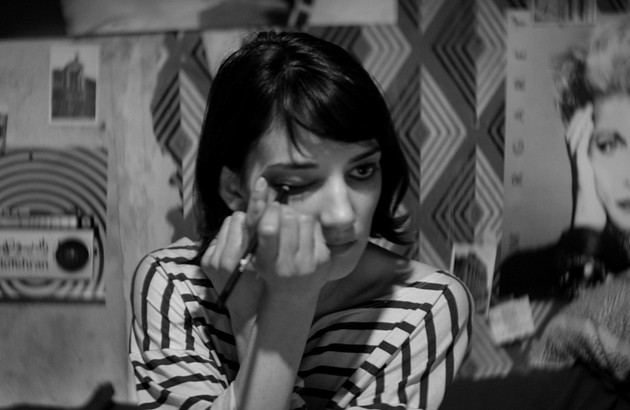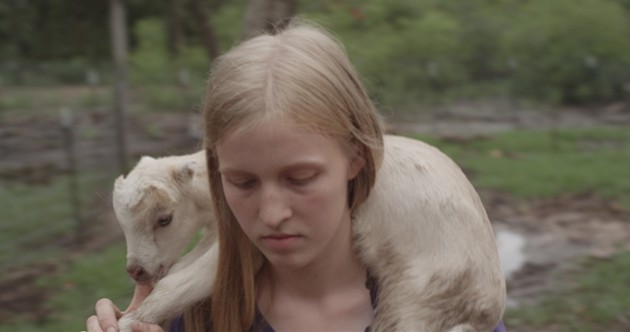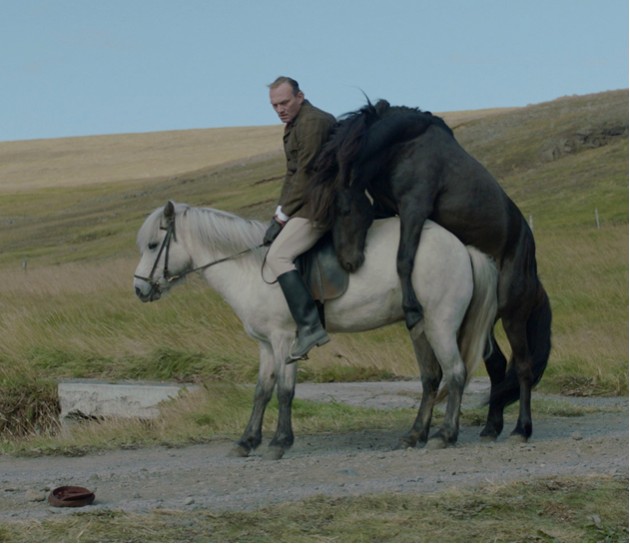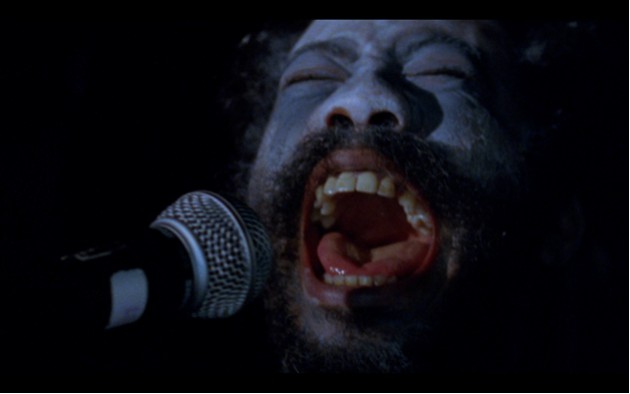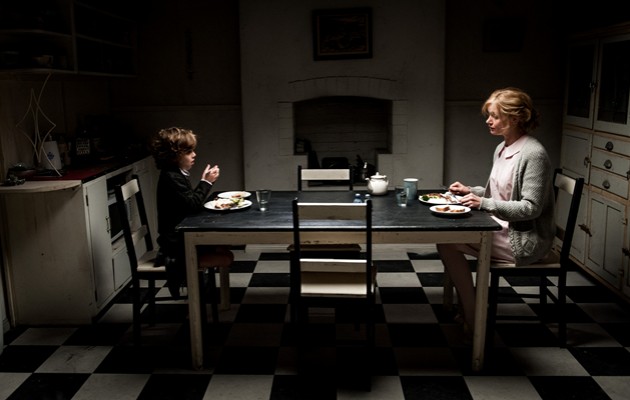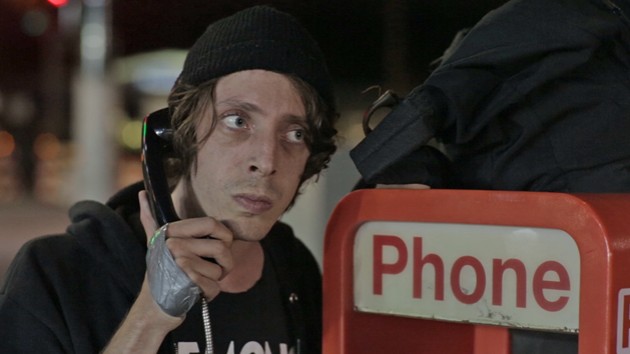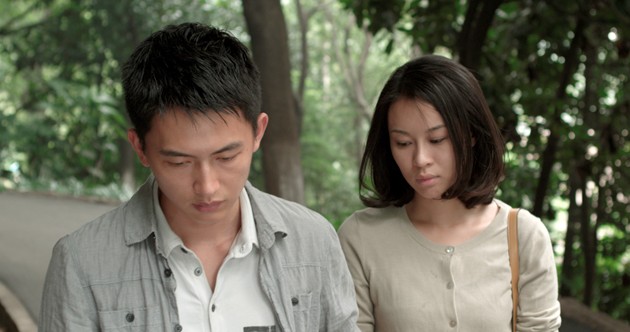New Directors/New Films 2014 Offers Promising New Talents and Unique Visions From Across the Globe










A GIRL WALKS HOME ALONE AT NIGHT (Ana Lily Amirpour)
New Directors/New Films opened this year with Amirpour’s debut feature, which premiered at this year’s Sundance Film Festival, and comes attached with a neat, provocatively intriguing description: it’s “the Iranian feminist vampire/spaghetti western movie.” As that tagline indicates, this film wears its influences firmly on its sleeve, and – pardon the pun – deeply in its veins. Set in an imaginary Iranian town called Bad City (but actually shot in California), stylish, high-contrast black-and-white imagery grace the seedy, noirish milieu depicted here, a town full of pimps, prostitutes, and junkies. Struggling to maintain his humanity in this atmosphere, as well as trying to find a way to blow town, is Arash (Arash Marandi), a handsome, James Dean type who rides around in a vintage car. Despite his coolness, he is addled by two older men who cramp his style: a junkie dad and a dealer/pimp who holds the debt Arash’s father owes over the son, and takes the car as payment.
Nocturnally haunting Bad City is the titular “girl” (Shiela Vand), who affords the film its unique image of a hijab-wearing vampire who rides a skateboard in search of her prey. But unlike others, this is a vampire with a conscience: she attacks men who exploit and abuse women, a sort of feminist vigilante. This activity becomes complicated when she meets Arash and becomes attracted to him. A Girl Walks Home Alone at Night is nothing if not stylish, and studiedly cool; Lyle Vincent’s cinematography and Sergio De La Vega’s production design are as much a star attraction as the actors, if not more so. However, outside of the novelty of its premise, the film doesn’t offer much more of substance; it’s so obsessed with its own coolness, irreverence, and taboo-breaking in an Iranian context (with its crime ridden milieu and brief nudity), that we are always kept at a remove. Also, once the novelty wears off, the film becomes draggy and thematically repetitive. Still, this debut feature marks the arrival of a promising talent.
WE COME AS FRIENDS (Hubert Sauper)
The title of Austrian documentarian Sauper’s angering and deeply disturbing documentary proves to be both a bitterly ironic joke and an expression of how, even at this late point in history, the African continent can still be regarded as a mysterious planet. The second in Sauper’s proposed trilogy of films about contemporary Africa, after 2004’s Darwin’s Nightmare, We Come as Friends focuses on the circumstances surrounding Sudan’s 2011 partition, a referendum that resulted in the very new country of South Sudan. Unfortunately, as Sauper powerfully shows us, this was the beginning and end, for the most part, of ordinary Sudanese having any say over the fate of their country.
As Sauper travels across the country in a self-built plane, we see that capitalist exploitation and neo-colonialism remains a sadly recurring constant of this country’s existence. All the foreigners who have their hands in Sudan – the Chinese oil drilling company poisoning the water in the surrounding villages; U.S. evangelicals setting up religious shop; self-absorbed UN case workers; rapacious US-based land developers – have in common the shockingly freely expressed desire to take what they can from the country while giving very little back to the Sudanese people. Sauper’s images lend a darkly alluring beauty that being this woeful situation into even sharper relief.
(March 22, 3:45pm)
STOP THE POUNDING HEART (Roberto Minervini)
Italian-born, U.S.-based filmmaker Minervini offers an intriguing fiction/documentary hybrid in Stop the Pounding Heart, the third in his trilogy of films about denizens of rural Texas, and featuring people featured in the two previous sections of the trilogy, The Passage and Low Tide. The emphasis is placed much less on narrative than it is on capturing the subtle rhythms and routines of his characters’ lives, with an approach to visually beguiling minimalism that have quite rightly drawn comparisons to Bresson and Malick. Though Minervini doesn’t quite reach the brilliant heights of these other directors, his film exhibits its own admirable qualities.
The film closely follows Sara (Sara Carlson), the eldest daughter of goat farming family, who is raised in a strictly devout religious fashion, homeschooled to limit corrupting influences. The women have drilled into them the idea that their role is to be subservient to God and their future husbands. Another principal character is Colby (Colby Trichell) a young man about Sara’s age who is an amateur bull rider, and who also has a Christian background, but one much less doctrinaire; bullriding and shooting guns are his family’s pastimes. The film concocts a subtle attraction between them, one that has Sara doubting her religious devotion. Minervini presents all this with sympathy, great attention to detail, and a refreshing lack of judgment and stereotype.
(March 23, 3:30pm)
DEAR WHITE PEOPLE (Justin Simien)
Simien’s sharply clever and exceptionally well-acted debut takes more than a few cues from the penetrating satire and social/racial commentary of such Spike Lee films as School Daze (which Dear White People often feels like an updated version of/response to) and Do the Right Thing (which is also built around a confrontational climax). But although this sort of homage is perhaps unavoidably embedded in this scenario of racial politics and black people struggling to find their identity and social standing in white-dominated elite academic institutions, Dear White People never feels derivative and always is intensely of the moment. The past few years have seen an increasing number of films, mainly in the independent sector, dealing with black-oriented themes; in contrast to the earnest seriousness of many of these, Dear White People takes the very effective tactic of couching its many very serious points in satire and comedy.
Set in the fictional Ivy League Winchester University, Simien hilariously skewers the clueless notions of a “post-racial” society that give license to white students to mock stereotypes of black identity for party purposes – a closing credits montage brings home the fact that such incidents are all too real on college campuses. However, Simien also has some barbs for the black students whose obsessions with conforming to rigid notions of identity can sacrifice as sense of humanity in the process. And although Simien sometimes bites off more than he can chew, attempting to juggle more plot complications and issues than he can completely give full justice to, the sharpness and the smartness of his film always shines through. As does the films excellent performances especially by Tessa Thompson and Tyler James Williams, offering nuanced portrayals of black characters that are still unfortunately quite rare in their complexity.
(March 21, 9pm and March 23, 6pm)
OF HORSES AND MEN (Benedikt Erlingsson)
The rugged yet picturesque vistas of the Icelandic countryside and the relationships between men (and women) and their beloved horses are combined with potent comic effect in Of Horses and Men, a major highlight of this year’s festival. Mordant, irreverent humor is the main characteristic of the interconnected vignettes that comprise this film, in which human folly is often hilariously highlighted in these interactions with animals and the natural world. The tone is set early by an indelibly memorable image: that of Kolbeinn (Ingvar E. Sigurdsson), the proud owner of a well-bred mare, whose horse is mounted by a wayward stallion while Kolbeinn is still in the saddle. This happens in full view of his neighbors, viewing the scene through their binoculars. Kolbeinn later goes to extreme measures to deal with his mortification caused by his horse’s deflowering. Along the way other characters take to the water on a horse in search of liquor, get blinded by a wire fence, and use a dead horse’s carcass for protection from extreme cold. Erlingsson, whose previous background is in acting, and short film and theater directing, shows remarkable cinematic talent in his debut feature.
(March 22, 6:15 and March 24, 6:30pm)
A SPELL TO WARD OFF THE DARKNESS (Ben Russell and Ben Rivers)
Avant-garde filmmakers Russell and Rivers collaborate here to create a film that is only narrative in the very loosest sense. It follows the journey of an unnamed man (Brooklyn-based musician Robert Aiki Aubrey Lowe) as he travels through three environments: a commune on an island in Estonia; the wilderness of northern Finland; and fronting a black metal band in Norway. (This information can only be learned by reading the press material; none of these locales are identified on screen.) As in their solo work, A Spell to Ward Off the Darkness contains very strong documentary elements, and an extremely slow cinema approach that demands extreme patience from its audience. A sort of incantatory mysticism is the goal here, as indicated by the title. The philosophical conversation of the commune members, the lengthy stretches of Lowe rowing his boat, walking, reading, and brooding in silence, and the audience members seemingly put into a trance by loud music, all contribute to the effect. A combination of movie and art installation, one’s sensibilities and inclinations toward this type of cinema will determine if you find the ultimate effect hypnotic or merely soporific.
(March 22, 9pm and March 25, 6:30pm)
THE BABADOOK (Jennifer Kent)
Australian first-time feature director Kent scores with a film that deeply infuses its familiar genre elements – a supernatural invading menace, jolts and scares in a house at night – with sharp psychological insight and a beautifully drawn portrait of grief, embodied by excellent performances Essie Davis and Noah Wiseman as the single mom and young son at the narrative’s center. The film’s design is a pleasing throwback to such influences as German Expressionist cinema and Italian horror, with its emphasis on hand-crafted effects rather than CGI or cheaply gory effects.
(March 22, 9:30pm and March 23, 9pm)
BUZZARD (Joel Potrykus)
Potrykus’ second feature, and the third of his “animal trilogy” (after the short Coyote and the feature Ape), is an acerbic blast of punk rock energy that brilliantly builds on the promise of Ape. As in the other films, Buzzard features a hilarious and riveting performance by Joshua Burge as Marty Jackitansky, a misanthropic slacker office temp who spends his time running petty scams and indulging his unfocused rage against the world and his contempt for everyone around him. When his latest scam of cashing customers’ refund checks threatens to be exposed, he panics and goes into hiding, crashing in the basement of his co-worker Derek (Potrykus), the closest he has to a best friend. Shot guerilla-style on the streets of Grand Rapids and Detroit, Buzzard casts an unblinking gaze at its prickly protagonist and its caustic take on life as a wage slave.
(March 23, 6:15pm and March 24, 8:30pm)
YOUTH (Tom Shoval)
There have been some very impressive films coming out of Israel in the past few years, and Shoval’s suspenseful and beautifully crafted debut feature is one of the finest. Youth is a potent evocation of Israel’s economic crisis, with its story of two brothers (played in fine performances by actual identical twin brothers David and Eitan Cunio) who hatch an ill-conceived kidnapping scheme in an attempt to arrest their family’s downward economic trajectory. Their plan is fueled by the omnipresence of the military – which provides the recently-enlisted older brother with the rifle he uses for the kidnapping – as well as the violent American action films which seem to provide some inspiration. The film features masterful use of widescreen photography and tracking shots, as well as such excellently crafted scenes such as a family dinner which gains considerable tension from the brothers’ (and our) anxiety over the trapped girl they have confined in the basement shelter of their family’s house.
(March 25, 9:15pm and March 26, 6pm)
TRAP STREET (Vivian Qu)
Qu’s debut feature is an intriguingly slow-burn drama that effectively evokes an unsettling atmosphere of everyday surveillance, both of the state and private varieties, with canny use of classic noir tropes. The film closely follows its protagonist Qiuming (Lu Yulai), a young man who works as a street surveyor for a digital mapping company, who becomes fatefully smitten with Lifen (He Wenchao), an alluringly beautiful woman he spies at work one day. The rather callow and naïve Qiuming begins to pursue her and becomes enmeshed in the mystery of the titular “trap street” which doesn’t show on GPS, and where Lifen works for a shadowy organization housed in a “Lab 203.” Qiuming, who works odd jobs on the side installing video cameras for private businesses and sweeping officials’ hotel rooms for bugs, soon becomes a victim of this pervasive surveillance and the state authority this represents. The crisply vivid digital images form a sharp contrast to the amorphous nature of the forces controlling both Qiuming and Lifen, which remain mysterious and undefined to the end. Trap Street is another great example of the impressive work currently emerging from Chinese independent cinema today.
(March 28, 6:30pm and March 29, 4pm)

Around the Internet
Recent Posts
Leading Voices in Global Cinema
- Peter Martin, Dallas, Texas
- Managing Editor
- Andrew Mack, Toronto, Canada
- Editor, News
- Ard Vijn, Rotterdam, The Netherlands
- Editor, Europe
- Benjamin Umstead, Los Angeles, California
- Editor, U.S.
- J Hurtado, Dallas, Texas
- Editor, U.S.
- James Marsh, Hong Kong, China
- Editor, Asia
- Michele "Izzy" Galgana, New England
- Editor, U.S.
- Ryland Aldrich, Los Angeles, California
- Editor, Festivals
- Shelagh Rowan-Legg
- Editor, Canada


